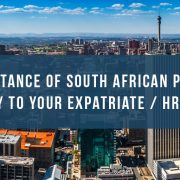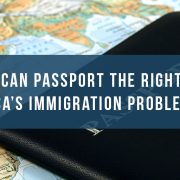Archive for month: May, 2018
Department of Home Affairs clamping down on illegal immigrant employment
/in Archived, News, Xpatweb News /by xp-adminMarisa Jacobs, Immigration Specialist at Xpatweb, says that considering recent arrests that have been made, HR professionals, managers, business owners and CEOs need to make sure that systems are in place to ensure that expatriates are legally employed within their business.
“The Department of Home Affairs has warned that they will be increasing the number of audits and investigations among South African companies that employ foreign nationals. This isn’t an empty threat and they are clamping down on foreign nationals who contravene the act as well as employers who are illegally employing foreigners. Anyone who is deemed responsible for the appointment of the person could face repercussions which means that everyone from HR managers to CEOs could face fines or imprisonment,” says Jacobs.
Pitfall no.1: Employees job titles don’t match work visa job titles
Making sure that an employee’s job title matches the title on their work visa is a vital step to ensuring that foreigners are complying with the Act.
“It can happen that a company employs a foreign national and that the employee is promoted or moved within the business. When an employee changes jobs and their job title or position changes, their work visa may no longer comply with the conditions thereof. The process to update the visa so that it is in line with the work contract is relatively simple and straightforward, but it’s a step that many employers overlook, and this can put them at risk to non-compliance,” says Jacobs.
Pitfall no.2: Information on permits don’t match DHA system information
If a company has employed a foreign national already in possession of a visa, the company may not know if the worker’s visa is legitimate, whether it was obtained in the correct manner or even if it was issued by the DHA.
“In this case, we recommend that employers contact the DHA to check what information is on the system. This additional check beyond looking at a work visa is needed to ensure compliance with the Act,” says Jacobs.
Pitfall no.3: No skills transfer plan
Another potential pitfall that companies should take note of is the condition relating to the transfer of skills. Certain categories of work visas for foreign nationals stipulate that the skill that is being imported needs to be transferred to local citizens. If a company is audited by the DHA, the company may be asked to present their skills transfer plans.
“One of the main reasons South African businesses employ foreign nationals is because we don’t have the skills, knowledge or expertise within our borders. Having a skills transfer plan in place is a great opportunity for local employers to upskill their employees and give them an opportunity to learn from foreigners so that they can cultivate the skills that are needed within their business as well as the country. Besides requesting a copy of the company’s skills transfer plan, DHA may further request to interview people who have been earmarked to learn from the foreign nationals,” concludes Jacobs.
The Importance of South African Permanent Residency to your Expatriate / HR Strategy
/in Archived, News /by xp-adminSince the release of the White Paper for International Migration in South Africa last year, more and more expatriates are seriously considering applying for Permanent Residency before this category is permanently removed from South African immigration law.
Why Permanent Residency?
Permanent Residency allows the holder to live and work in South Africa unlimitedly and includes the right to work without restriction, engage in business, own property, study and do all activities a citizen is permitted to do except for voting in the South African elections. You may only do the latter once you have been naturalised as a South African citizen. Permanent Residency in South Africa also allows its holder maximum flexibility with regards to entry and exit through the country’s borders.
Where an expatriate and family hold this status, they no longer need to go through the work and residency visa process and for all practical purposes this means that the employer deals with a normal South African employee.
What does the Act say?
Permanent Residency is granted to a foreigner who can meet the criteria as set out in Sections 26 and 27 of the Immigration Act of 2002, as amended, and Regulations 23 and 24 respectively.
Section 26 is applicable to foreigners who have been residing in South Africa based on their work visas for a minimum period of five years and is also applicable to spouses and dependents of South African citizens or Permanent Residency permit holders.
Section 27 is applicable to foreigners who are in possession of a permanent work offer in South Africa, have exceptional skills and qualifications, intend to establish a business in South Africa, qualify as refugees, qualify as retired persons, are financially independent, are relatives (biologically or judicially adopted) of a South African citizen or Permanent Residency permit holder or have been in a spousal relationship with a South African citizen for more than 5 years.
A word of caution
Always keep in mind any adverse tax and exchange control considerations, meaning that whilst Permanent Residency may at first glance appear like a good idea from an entry perspective, from a holistic planning perspective, it may be considered a less favourable choice. This is where holistic consideration becomes important, i.e. the fiscal aspects and tax planning must be considered as part of the service.
Useful Facts:
- The status of a Permanent Resident does not affect the holder’s citizenship. The Permanent Resident can obtain a South African identity book endorsed as “non-citizen”, but not a South African passport.
- In some categories or instances, certain conditions are attached to the Permanent Resident permits issued.
- The Permanent Resident process takes approximately 4 – 10 months and sometimes longer.
- Spending a significant amount of time outside the country can result in loss of Permanent Residency.
- Traveling in and out of South Africa becomes much easier and the tedious need for extending visas becomes a thing of the past.
25 illegal immigrants nabbed for contravening Immigration Act
/in Archived, News /by xp-adminAt least 25 illegal foreign nationals has been arrested for contravening the Immigration Act, Cape Town Police said on Thursday.
The labour and home affairs departments accompanied by the police raided several Cape Town businesses alleged to be employing illegal immigrants after receiving complaints. The raids were conducted in China City in Milnerton and Canal Walk in Century City.
Twenty five illegal foreign nationals were arrested for contravening the Immigration Act.
”Random inspections at places of employment are conducted to ensure employers of foreign nationals comply with immigration laws. Employing foreigners who are not in possession of enabling documents is an offence. The department, working in partnership with other law enforcement agencies, will continue to enforce immigration legislation with no respite.’
The raids were carried out after several complaints were lodged with the departments.
Source: African News Agency/ANA
South African law enforcement agencies launch raids on illegal immigrants
South African law enforcement agencies have successfully conducted raids on illegal immigrants in Cape Town, rounding up a total of 25 suspects, authorities said on Thursday.
The raids were launched on Wednesday in two areas frequented by illegal immigrants, said Thabo Mokgola, spokesperson of the Department of Home Affairs.
The 25 illegal foreign nationals were arrested for allegedly contravening the Immigration Act, according to Mokgola.
More illegal immigrants will be arrested as investigations are continuing, he said.
Law enforcement agencies also arrested a manager at one of the restaurants that were visited, said Mokgola.
The manageer, he said, will be charged for contravention of the Immigration Act, which prohibits employment of illegal foreign nationals in South Africa.
Random inspections at places of employment are conducted to ensure that employers of foreign nationals comply with immigration laws, Mokgola said.
Employing foreigners who are not in possession of enabling documents is an offence, he added.
“Those who persist in flouting immigration and labor laws of the country will face the full might of the law,” Mokgola warned.
This is in support of the national drive towards safer communities wherein citizens and documented foreign nationals are and feel safe, he added.
Source: Coastweek.com
Illegal Nationals Arrested, including an Employer, as Dept. of Home Affairs Continue Inspections
South African law enforcement agencies have successfully conducted raids on illegal immigrants in Cape Town, rounding up a total of 25 suspects, authorities said on Thursday.
The 25 illegal foreign nationals were arrested for allegedly contravening the Immigration Act, according to Thabo Mokgola, spokesperson of the Department of Home Affairs. He said more illegal immigrants will be arrested as investigations are continuing.
Mokgola confirmed law enforcement agencies also arrested a manager at one of the restaurants that were visited. The manager, he said, will be charged for contravention of the Immigration Act, which prohibits employment of illegal foreign nationals in South Africa. Mokgola went on to say that random inspections at places of employment are conducted to ensure that employers of foreign nationals comply with immigration laws. Employing foreigners who are not in possession of enabling documents is an offence, he added.
“Those who persist in flouting immigration and labour laws of the country will face the full might of the law,” Mokgola warned. He said this is in support of the national drive towards safer communities wherein citizens and documented foreign nationals are and feel safe.
Source: Independent.ng
Media Statement of Immigration and Labour Raids in Cape Town
In response to complaints lodged, the Departments of Home Affairs and Labour, in conjunction with the SA police, conducted raids on businesses employing illegal foreign nationals, in Cape Town on Wednesday, 09 May 2018.
The raids were conducted in China City in Milnerton and Canal Walk in Century City. In total, 25 illegal foreign nationals were arrested for contravening the Immigration Act. The number of those arrested is expected to increase as investigations are continuing. A manager at one of the restaurants that were visited will be charged for contravention of the Immigration Act, which prohibits employment of illegal foreign nationals in South Africa.
Random inspections at places of employment are conducted to ensure employers of foreign nationals comply with immigration laws. Employing foreigners who are not in possession of enabling documents is an offence. The department, working in partnership with other law enforcement agencies, will continue to enforce immigration legislation with no respite.
Those who persist in flouting immigration and labour laws of the country will face the full might of the law. This is in support of the national drive towards safer communities wherein citizens and documented foreign nationals are and feel safe.
Source: Department Home Affairs
25 illegal immigrants nabbed for contravening Immigration Act
South African law enforcement agencies launch raids on illegal immigrants
Illegal Nationals Arrested, including an Employer, as Dept. of Home Affairs Continue Inspections
Is an African passport the right solution to SA’s immigration problems?
/in Archived, News /by xp-adminEnforcement
The home affairs department has warned that it has begun enforcing the law by conducting regular audits on employers to ensure that they comply with the regulations. This puts the onus on companies and organisations to ensure all their expatriate employees are correctly documented before they begin work.
According to one source, South Africa – about six times larger than the United Kingdom – has only 600 inspectors to service the entire country. Yet, about 3000 British inspectors cover the London area alone. Comparing the numbers, this makes the interception of illegal immigrants at border posts, the monitoring of foreigners within the country – legal or not – and the tracking of those who are undocumented or have overstayed their welcome a real and notable challenge for the department.
Agreeably, the home affairs department should make provision for any permit application that is being made, however it is evident that the high volumes are becoming strenuous for the department. By considering this and that the home affairs department is poorly funded by the government, grossly understaffed and the large influx of applications they receive on a daily basis, this enforcement is perhaps an attempt to improve the current immigration system and identify possible areas of improvement.
Is there a better way?
In contrast, many representatives of the African Union, of which South Africa is a member, are calling for an African passport that will facilitate freedom of movement across the continent. Such a system would certainly do away with the high cost and manhours needed to legislate and control the situation, but is it the right solution for South Africa?
One could look to the European Union whose members, in an effort to promote free trade, have allowed their people to move easily from one member country to the next. However, this freedom has an unwelcome side effect because it makes it easier for terrorists to find their way to target countries from those states with poor entry control. We see the tragic results regularly in news reports. Thankfully, South Africans have yet to experience a foreign terrorist attack on their soil. However, lacking our resources, this may be attributed in some degree to our conservative outlook on immigration.
This is not to say that we should take a Trump-like view of immigration or rule out the possibility of opening our borders one day.
The government and business certainly welcome expatriates who enter the country legally and bring with them the critical skills so urgently needed to be competitive in the global market. But today is not the right day, not for our society, our economy nor our national security.
Until then, the law remains and every organisation is obliged to ensure its foreign workers are employed legally and in compliance with the conditions of their visas.
Government and business alike certainly welcome foreigners who enter the country legally and bring with them the critical skills so urgently needed to be competitive in the global market.
Becoming compliant
Considering the above, it is important that employers make provisions and ensure that they are adhering to the law, advisably by keeping a copy of the Act at hand.
Will the home affairs department be able to check on every business to ensure they adhere to the law? Perhaps not, but with the consequence of a stiff fine or up to one year of imprisonment hanging over the heads of each company leader, HR manager or person responsible for employing the illegal foreigner, few will take the chance of a random inspection arriving at their door. Even for those who employ foreign nationals at much lower rates than local workers regardless of their visa status, the risk is not worth it.
This is compounded by the fact that the department has laid out definite plans to upgrade its systems and services following the implementation of the white paper on international migration, which is said to be concluded imminently, the department envisages to become completely digital by 2020. Organisations should start working towards complete compliance as soon as possible.
Getting help
As a first step, employers are advised to carry out a comprehensive audit of all their foreign national employees, bearing in mind that the law will assume they knew of any irregularities at the time of hiring and will be held accountable accordingly.
There are a number of expatriate services agencies in South Africa who offer visa checks and assistance with the necessary applications and corrections where required and can certainly make the process less burdensome. It also adds weight to an organisation’s case that they engaged an impartial third party, especially when an undocumented employee is discovered in theirs ranks.
FIND US
Johannesburg
17 Eaton Avenue,
Bryanston, Johannesburg,
Gauteng, 2191
South Africa
George
55 York Street
Dormehls Drift
George, 6529
South Africa
CONTACT US
Telephone:
South Africa: 011 467 0810
Postal:
PO BOX 35046
Northcliff
2115
IN THE NEWS
- Another Positive Move To Attract More Tourists To SA
- Bringing in the Bomb Squad at Home Affairs
- How Home Affairs’ Immigration Reforms Could Drive SA’s Growth in 2025
- Phindiwe Mbhele on Remote Work Visa: Splendid Cape Town is wooing more and more digital nomads
- Cape Town Shines, and So Does South Africa’s New Critical Skills Visa Overhaul





